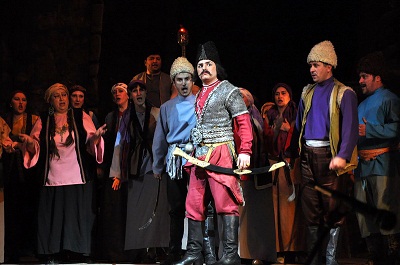Koroglu opera by famous composer Hajibeyov due late April

By Nigar Orujova
A showcase of the prominent Azerbaijani opera Koroglu (The Blind Man's Son) by famous composer Uzeyir Hajibeyov will be held in the Azerbaijan State Academic Opera and Ballet Theater in Baku on April 28.
The opera in five acts, which is based on a heroic legend prominent in the oral traditions of the Turkic peoples, premiered on April 30, 1937 at the opera and ballet theater conducted by the composer himself with remarkable Bulbul and Gulyara Iskenderova in lead roles. Since that time, the opera has been considered a treasure of Azerbaijani opera art and has always gathered a large audience.
In the late 1980s, the Koroglu overture, which embodies the main idea of the opera, became an unofficial anthem for the Azerbaijan movement for independence from the Soviet Union and is still very popular in Azerbaijan.
The theater's troupe dedicates the upcoming performance to the 90th anniversary of National Leader Heydar Aliyev.
The lead parts will be performed by Azerbaijani People's Artist Samir Jafarov and young talented vocalist Ilaha Efendiyeva. The opera will be conducted by Azerbaijani People's Artist, Professor Javanshir Jafarov.
The Koroglu opera is a culminating point of Hajibeyov's works, where he described a hero of the people who struggled against unjust rulers.
The storyline is based on a national epos, which is widespread in Azerbaijan, the Caucasus, Central Asia, Turkey, and Iran, about poor, abused villagers who rise up to defeat their unjust, oppressive khans and beys (landowners) in the 16-17th centuries. This plot matched perfectly with the Soviet ideology and Hajibeyov was awarded for the Koroglu opera with the Lenin Award in 1938, Stalin and People's Artist award in 1941.
The fight of two opposing forces -- the people and feudal forms of governance -- forms the dramatic basis of the opera. The drama shows the mounting fight of the people for the liberation from the oppressors and enemies of the motherland.
However, it is hard to believe that it was really the khans and landowners that the composer had in mind when his characters raged against injustice and exploitation. A detailed study of the content suggests a broader interpretation of the concept of an oppressor.
The composer's own world turned upside down when the Bolsheviks took power in Baku in 1920. Hajibeyov distanced himself from political affairs during the Soviet period, but prior to pursuing a career in music; he had been involved in journalism and had written many articles attacking political injustice.
Koroglu is a monumental epic opera with chorals and dancing scenes, which shows the peasants' general nature.
The protagonist Koroglu Rovshan is a remarkable individual endowed with high consciousness, courage and bravery. He also proved to be a person who can really love and get inspiration for fighting from his love.
The main female character of the opera is Nigar, the beloved of Koroglu, who is also a brave, courageous person capable of facing such a cruel enemy as Hasan-khan.
Hasan-khan is a personification of despotism, a power-thirsty, terrible tyrant. Hasan-khan's aria is one of the best vocal parts of the opera, whereby a laconic image of tyranny is shown.
Hajibeyov himself was like Koroglu in his life, first criticizing the colonialist policy of the Czarist regime until 1918, and later lambasting the Bolsheviks.
He was a member of the Musavat party, which succeeded in establishing the Azerbaijan Democratic Republic in 1918.
When the Soviets came to power, most of the Musavat leaders and individuals closely associated with them were arrested or killed.
Hajibeyov survived, but he lived under the constant threat of being named an enemy of the nation.
He suffered professionally too. He had been amazingly prolific before the Soviets took power, and wrote six operas and three musical comedies in 1908-1915.
With the arrival of the Bolsheviks, however, Hajibeyov's works were labeled as bourgeois and pre-revolutionary.
In the 1930s, he started producing major works and the Koroglu opera is one of them. This opera made Hajibeyov to be honored by the political system he hated.
Here we are to serve you with news right now. It does not cost much, but worth your attention.
Choose to support open, independent, quality journalism and subscribe on a monthly basis.
By subscribing to our online newspaper, you can have full digital access to all news, analysis, and much more.
You can also follow AzerNEWS on Twitter @AzerNewsAz or Facebook @AzerNewsNewspaper
Thank you!
